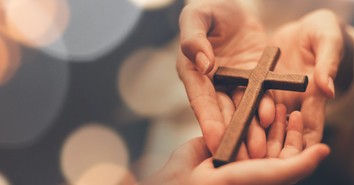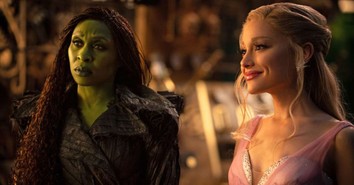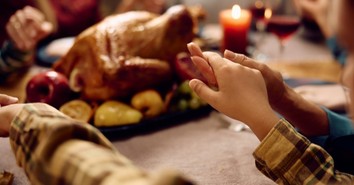Denominations Divided over Iraq, "Under God" Sermon & more

- Denominations Divided Over Response to Iraq
- "Under God" Sermon Gets Repeat Performance
- Two Ethiopian Protestants Jailed Since May
- Court Upholds Rights of School Bible Club
Denominations Divided Over Response to Iraq
Voices for the nation's major religious bodies are in disagreement over the United States' policy toward Iraq and Saddam Hussein. On Monday, the Rev. Richard Land, head of the Southern Baptist Ethics and Religious Liberty Commission, argued that U.S. action against Iraq would constitute a "just war."
Not all denominational leaders agree with Land's support of the Bush administration's tough policy stance, however. According to the United Methodist News Service, a group of 37 leaders, including several United Methodists, issued a statement on Aug. 29, urging the United States to use restraint in dealing with Iraq.
In his comments to Baptist Press, Land said, "If you are looking for just cause, we have already passed that threshold." Identifying reasons that justify action against Iraq, Land stated that "Saddam Hussein is developing at breakneck speed weapons of mass destruction he plans to use against America and her allies. . . He has broken all agreements that were a condition of the ceasefire in the Gulf War, including allowing arms inspectors in his country."
According to Associated Press, the head of the Episcopal Church, Presiding Bishop Frank Griswold, said last week that the United States should pursue diplomacy, because military action would cost Iraqi and American lives, alienate allies and destabilize the Middle East.
Last week the Central Committee of the World Council of Churches, which includes officials from many U.S. Protestant and Orthodox denominations and the National Council of Churches, reiterated its 1991 position that "no nation or group of nations is entitled to prosecute vengeance against another," and that no single nation is entitled to take action that causes devastation and massive suffering.
"Under God" Sermon Gets Repeat Performance
Last Sunday the Rev. George Docherty delivered a repeat performance of a sermon that helped in the effort to insert the words "under God" in the American pledge almost 50 years ago. Many are unaware that the phrase "under God" wasn't added to the United States pledge of allegiance until 1954. Congress added the phrase that year in response to a public campaign that was reacting to communism and its secular philosophy.
The Rev. Docherty, then pastor of the New York Avenue Presbyterian Church in Washington, D.C., influenced the congressional action when he delivered a passionate sermon to an audience including President Dwight Eisenhower. News services reported on the message and the sermon was placed in the Congressional Record.
"To omit the words 'under God' is to omit the definitive character of the American way of life," Docherty declared. "What the Declaration (of Independence) says, in effect, is that no state church shall exist in this land. This is separation of church and state. It is not and never was meant to be a separation of religion and life."
This time the sermon was delivered before the Huntingdon Presbyterian Church in Central Pennsylvania according to Scripps Howard News Service. Rev. Docherty is now 91. The issue remains relevant in light of the national debate over the phrase's constitutionality.
"There was something missing in this pledge," Docherty noted last Sunday, "and that which was missing was the characteristic and definitive factor in the American way of life. Indeed, apart from the phrase 'the United States of America,' this could be the pledge of any republic."
Two Ethiopian Protestants Jailed Since May
Two evangelical church leaders are in their fifth month of prison detention in Maychew, Ethiopia. According to Compass Direct, Kiros Meles, 46, and Abebayeh Desalegn, 35, were both jailed after an Ethiopian Orthodox church member was shot to death April 23 when police tried to bring a riot under control.
The riot started after local police went to investigate an Orthodox priest who had been demanding that all evangelicals be forcibly removed from the town. When police arrived, members of the Orthodox congregation surrounded the priest to protect him from arrest. Convinced that evangelicals were behind the investigation, Orthodox members planned and executed an attack against the town's five evangelical churches that night, along with the homes of two church leaders.
The attacks left the churches severely damaged and looted. The houses of Meles, leader of the Hiwot Birhan Church, and Pastor Baraki of the Full Gospel Church were also trashed and looted. Several members of evangelical congregations were stoned and beaten, though none sustained lasting injuries.
In an attempt to control the crowd, the police fired into the air near Meles' home. When a stray bullet struck and killed an Orthodox church member, his companions accused Meles of shooting him. In an apparent effort to placate the mob, the police then arrested Meles.
Although the two church elders have been told they are "suspects" in the killing, the policeman believed to have fired the fatal bullet into the air during the melee is also in custody. No known charges have been filed against the evangelicals. To date, local courts have refused to release them, even on bail.
Neither Meles nor Desalegn, who was arrested weeks later on May 10, has been charged with the killing. Over the past three months, the two church leaders have been hauled before the Maychew Woreda Court at least five times. Their next court appearance is set for September 16 before the Maychew Zonal Court.
According to one close observer, evangelical believers in Ethiopia "live with being insulted and degraded on a daily basis" by some elements of the long-dominant Orthodox Church. "But even the Orthodox community believes the two evangelicals are innocent, and that the policeman is the guilty one," a recent visitor to Maychew told Compass. According to Meles' wife, her husband has never owned a gun.
Court Upholds Rights of School Bible Club
The American Center for Law and Justice (ACLJ), an international public interest law firm, said a decision by the 9th Circuit Federal Appeals court that a Washington State school district discriminated against a Bible club is a critical ruling that reinforces existing Supreme Court law and is a victory for those students who want to express a religious message in school.
In a decision issued by a three-judge panel of the U.S. Court of Appeals for the Ninth Circuit, the court found that the Bethel School District violated the constitutional rights of the student who formed the Bible club by refusing to give the organization the same status and benefits granted to other school groups.
The case began in 1998 when the ACLJ filed a federal lawsuit on behalf of Tausha Prince, then a 10th grade student at Spanaway Lake High School in Spanaway, Washington after school officials refused to recognize a request to form World Changers - a student-led, student-initiated Bible club, saying the club could not be recognized because it was "religious." That meant that the club did not have access to benefits given to other student groups - including the school's public address system. While refusing to recognize the Bible club, the school district permitted other student groups to meet including the Chess Club, Heritage Club, Bowling Club and Hiking Club.
In April 1999, a federal judge ruled in favor of the school district and the case was appealed to the U.S. Court of Appeals for the Ninth Circuit. In a decision released this week, a three judge panel of the federal appeals court ruled the school districted violated the Equal Access Act of 1984 and the Free Speech Clause of the First Amendment.
Originally published September 12, 2002.







